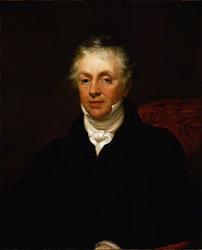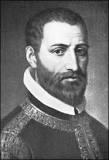Planning worship?
Check out our sister site, ZeteoSearch.org,
for 20+ additional resources related to your search.
- |
User Links
Person Results
‹ Return to hymnal



Export as CSV
Richard Farrant
1525 - 1580 Person Name: Farrant Hymnal Number: C11 Composer of "[The Lord is merciful and gracious]" in The Tribute of Praise Like many composers of his day, the early years of Richard Farrant’s (c.1525- November 30, 1580) life are not well documented. The first acknowledgment of him is in a list of the Gentleman of the Chapel Royal in 1552. It is assumed from that list that his birth was around 1525. Although, that cannot be accurately determined. During his life he was able to establish himself as a successful composer, develop the English drama considerably, founded the first Blackfriar Theatre, and be the first to write verse-anthems. He married Anne Bower, daughter of Richard Bower who was Master of the Chapel Royal choristers at the time. With Anne he conceived ten children, one of whom was also named, Richard.
As a member of the Gentleman of the Chapel Royal, Farrant was active in ceremonies surrounding the royal family. He began his work with the Chapel Royal around 1550 under the reign of Edward VI. Fortunately, for Farrant, this is a time that saw huge developments in Latin Church Music. Composers like William Byrd and Christopher Tye were busy expanding and elaborating on the Church Music of the day. In Farrant's twelve years with the Chapel Royal, he was able to participate in funerals for Edward VI and Mary I, and coronations for Mary I and Elizabeth I. After his work there, he took up a post as organist at St. George’s Chapel at Windsor.
For Farrant, the post at at Windsor became a permanent one that he retained for the rest of his life. Along with this, he also acquired the position of Master of the Chapel Royal choristers in November of 1569. Having the choirs of both of these institutions at his disposal gave him an outlet to showcase all of his compositions and plays. In fact, every winter he was able to produce a play for the Queen herself. These positions also allowed him to move back to London in 1576 and begin a public theater of sorts where he rehearsed some of his choir music openly. It was soon after, in 1580, that he passed away, having left his house to his wife.
Unlike many composers of his day that stuck to only music composition, Farrant also wrote many plays. One of his most important contributions to drama in England is of course the creation of the first Blackfriars Theatre. This eventually became one of the most important places in London for drama to develop during the Renaissance. Farrant is also one of the earliest and most well known composers that began to mix the two mediums of music and drama. It was this uncommon mixture that allowed him to begin to develop the composition style of 'verse.' This becomes prominent in a lot of his pieces including the anthems "When as we sat in Babylon" and "Call to remembrance" and "Hide not thou thy face."
--en.wikipedia.org/wiki/
Richard Farrant
Thomas Attwood

1765 - 1838 Person Name: Atwood Hymnal Number: C8 Composer of "[Praise the Lord, O my soul]" in The Tribute of Praise Thomas Attwood, born 1767; organist and composer; wrote many operas and other works; died March 24, 1838.
A Dictionary of Musical Information by John W. Moore, Boston: Oliver, Ditson & Company, 1876
Thomas Attwood
William Jackson
1730 - 1803 Person Name: Jackson Hymnal Number: C4 Composer of "[O sing unto the Lord a new song]" in The Tribute of Praise William Jackson of Exeter
William Jackson
E. W. Dunbar
1823 - 1893 Person Name: Rev. E. W. Dunbar Hymnal Number: 616 Composer of "DUNBAR" in The Tribute of Praise Edward Weldon Dunbar
E. W. Dunbar
J. W. Dadmun
1819 - 1890 Hymnal Number: 594 Author of "O the prospect, it is so transpsorting" in The Tribute of Praise Rv John William Dadmun USA 1819-1890. Born at Cambridge, MA, he completed his education at the Wesleyan Academy, Wilbraham, MA. At 22 he joined the New England Methodist Conference and pastored churches in the towns of Ludlow, Southhampton, South Hadley Falls, Enfield, Ware, Monson, Ipswich, and Lowell, the first Methodist Church and Grace Church, Boston and First Church, Boston Highlands. For a number of years he was also prison Chaplain and Superintendent of schools in the city institutions of Boston at Deer Island, off the coast of Maine. He married Lucy Ann Dutton, and they had seven children: Lucy, Wiletta, Francina, Charles,William and two others. He was initiated into Masonry at the Mt. Lebanon Lodge in Boston, MA, and served as Grand Chaplain and District Deputy Grand Master, which he immensely enjoyed. He rose in ranks within the organization and was instrumental in forming the Mt. Vernon Chapter in Roxbury, MA. He was elected Grand High Priest of the Grand Chapter of MA. He was Knighted into the De Molay Commandery in Boston, serving several years and rising to Grand Prelate of MA & RI, and attained to a number of other significant positions within the Masons. In later years, after Lucy died, he married Martha Jane Rogers. He collected songs and contributed lyrics to some, publishing a number of song books: “Army & Navy melodies” (1862), “The Melodian” (1862), “Revival melodies” , “The Eolian harp” (1860), “The sacred harmonium”, “new revival melodies”, “Musical string of pearls”, The Masonic choir” (1864), “The humming bird”, “Union league melodies”, “The new golden chain of Sabbath school melodies”, “The olive leaf”, “The timbrel” (1866), and others. Copies of these works have been sold around the world. He died at Boston, MA.
John Perry
J. W. Dadmun
Edward Hamilton
Person Name: E. Hamilton Hymnal Number: 723 Composer of "TRUTH" in The Tribute of Praise
Edward Hamilton
John Blow

1648 - 1708 Person Name: Dr. Blow Hymnal Number: C14 Composer of "[Lord, let me know mine end and the number of my days]" in The Tribute of Praise John Blow, doctor of music, born 1648 at North Collingham, England; was, in 1685 , musician to James II, and master of the choristers of St. Paul's Church; was a composer of ahtnems, church music, songs and other music; died in London, Oct 1, 1708.
A dictionary of musical information: containing also a vocabulary of musical terms, and a list of modern musical works published in the United States from 1640 to 1875 by John Weeks Moore (Boston: Oliver Ditson, c. 1876)
John Blow
Jacob Arcadelt

1505 - 1568 Person Name: Arcadelt Hymnal Number: P326b Composer of "[I acknowledge my transgressions]" in The Tribute of Praise Jacob Arcadelt born in the Netherlands towards the end of the 15th century, died in Paris. The story that he was a pupil of Joaquin Deprès is probably untrue. In 1540 he was admitted into the Pontifical Choir at Rome, and in 1555 (?) entered the service of Cardinal Charles of Lorraine, Duke of Guise, whom he followed to Paris. Arcadelt was on of the many Flemish composers who migrated to Italy; he helped to found the "great" Roman school, and was one of Palestrina's most distinguished forerunners. he united French delicacy of sentiment, Flemish mastery of musical form, and Italian culture in quite an exceptional way, and was at once one of the most important and prolific composers of his day. Together with Willaert and Verdelot, he was one of the founders of the madrigal. His first book of 53 madrigals (Venice, 1538) reached it sixteenth edition in 1617, and was followed by five other books. If in his church compositions Arcadelt's style is of almost heroic grandeur, and shows the most complete mastery over all the intricacies of counterpoint (albeit he seems to have despised the then popular "Netherlandish tricks"), in his Italian madrigals we discover perhaps the first dawn of the sentimental element in music. His French chansons, on the other hand, are perfect little cabinet-pieces of contrapuntal elaborateness. Notwithstanding the glorious musical epoch which followed close upon his death. Arcadelt's works were long looked upon with the greatest veneration' Frecobaldi wrote an organ piece on a them "del Signore Arcadelt," and even Liszt wrote a pianofote piece on an Ave Maria of his.
Cyclopedia of Music and Musicians by John Denison Camplin, Jr. and William Foster Apthorp (Charles Scribner’s Sons, 1888)
Jacob Arcadelt
H. L. Frisbie
Hymnal Number: 651 Composer of "THE LAND BEYOND THE RIVER" in The Tribute of Praise Early 20th Century
H. L. Frisbie


 My Starred Hymns
My Starred Hymns


